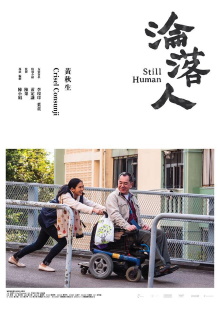
This title instantly raced up to the top of all of the critics’ lists of best Hong Kong films last year, making it practically required watching. It’s the feature film debut of its director Siu Kuen Chan who raised the production budget from winning a government award. It does star Anthony Wong but that was only possible because the veteran actor generously agreed to work for free. Unfortunately this is another one of those cases in which the film’s aims are laudable and speaks well of the director’s intentions but is really not a good film at all.
Wing Leung is a former construction worker who is left partially paralyzed after a workplace accident and now lives on a modest pension. He hired foreign maids to take care of him and is dismayed to learn that the newest hire, Evelyn from the Philippines, doesn’t speak Cantonese. Not having much of a choice, he resigns himself to learning English but their communication is thankfully made easier by modern smartphones. Meanwhile Evelyn connects with the local community of other Filipino domestic workers who advise her to act stupid in order to avoid being overburdened with work. After working past the initial trust issues however Evelyn finds Wing Leung to be a compassionate employer who doesn’t look down on her for being a maid while he in turn learns that she actually aspires to be a photographer and decides to help her pursue her ambition.
I read that this actually represents the very first time a migrant worker is seen as a main character in a major Hong Kong film. To me, it’s astounding that it took so long and is a sign of how far behind Chinese films are behind American ones in terms of political and social consciousness. This very young director’s intentions are of course praiseworthy and I love how she gives voice to the migrant workers in scenes are involve only them speaking in their own language. There’s a great sense of authenticity in their interactions as they discuss practical advice and the typical behaviors of their Hong Kong employers. Also great is their girls’ night out to show even they need to let their hair down and have fun once in a while. It’s obvious that Siu must have spoken to many real migrants from the Philippines in order to write such a script.
Unfortunately she is still lacking in the many skills needed to be a good director and that is all too evident. With the exception of Anthony Wong, the acting of everyone involved in atrocious, sometimes to a comical extent. The director commits the neophyte mistake of using sentimental music to highlight emotional moments, even crassly cutting out clubbing music while Evelyn delivers a line only to immediately switch back afterwards. That’s a mistake because the audience will notice you doing that instead of experiencing the intended emotion. I get that this was made a shoestring budget but this is not a well-made film at all.
But the film’s most important failure is that its insistence on presenting a positive view of migrant workers makes for a fairy tale that is not only wildly unrealistic but ends up undermining its core message. The fact is that most such migrants working in lowly paid domestic jobs stay in that role for their entire lives. Yet this film seems to equate according them respect as human beings to them having aspirations to move beyond these modest jobs. In the same vein, Wing Leung’s concern about Evelyn is entirely focused on her achieving her dream. He has no care for her family ties back in the Philippines or whether she has a husband or even children back home. The result is that Evelyn’s story is extremely atypical and therefore is highly unrepresentative of what most such migrants experience. I am once again reminded of the underappreciated Ilo Ilo which honestly acknowledges the imbalanced nature of the relationship between a migrant worker and her employers.
It’s still great that this film exists at all and it’s a sad statement on the Hong Kong cultural scene that it took so long for the lives of the hundreds of thousands of migrant workers in the territory to be acknowledged in their cinema. But Still Human is, by any measure, just not a good film however noble its director’s intentions are.
One thought on “Still Human (2018)”